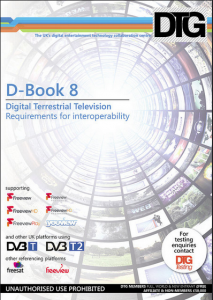
After more than 40 years of operation, DTVE is closing its doors and our website will no longer be updated daily. Thank you for all of your support.
DTG adds Freeview Play support with D-Book 8 release
 UK TV technical standards body the DTG has introduced support for the forthcoming Freeview Play connected TV service in the latest edition of the D-Book, the official document for digital-terrestrial TV technology guidelines in the UK.
UK TV technical standards body the DTG has introduced support for the forthcoming Freeview Play connected TV service in the latest edition of the D-Book, the official document for digital-terrestrial TV technology guidelines in the UK.
D-Book 8 includes a set of technology foundations for the new service, according to the DTG.
Freeview Play is to be based on a technical specification that combines Freeview HD with the pan-European HbbTV standard for hybrid broadband-broadcast services. Elements include a consolidated cross-platform, enhanced metadata stream, rules and guidelines on the UI and presentation of content and players, navigation principles including one-click access to live TV and the prominent display of core content across both linear and non-linear environments and simple on-screen branding. According to Digital UK’s guidelines, it should also provide opportunities for Freeview broadcasters to launch on-demand services alongside those provided by public service broadcasters.
The technology platform for the first profile of the platform is based on a common HTML5 application environment, a broadcast profile based on D-Book 7, including MHEG, the incorporation of DVB-DASH adaptive bit-rate streaming, an aggregated source of metadata providing forwards and backwards EPG with links to player content and a search API across both on-demand and broadcast content. The second profile is based on D-Book 8, includes HbbTV 2.0, Microsoft PlayReady DRM and other functionality.
“The D-Book 8 is a milestone for digital terrestrial TV in the UK, laying the groundwork for a new generation of connected TVs and set-top boxes,” said DTG chief executive Richard Lindsay-Davies.
”I’d like to thank the industry for its continued hard work on standards which will maintain the relevance of digital terrestrial TV to consumers through a changing spectrum environment and its evolution into a hybrid platform.”
Jonathan Thompson, chief executive of Digital UK, the body originally set up to ensure a smooth digital switchover, said: “The DTG’s development of the D-Book has been essential to the success of the digital terrestrial television in the UK. As DTT evolves for the connected age and prepares for an era of increased spectrum sharing, this latest edition will ensure consumers choosing Freeview get the best possible viewing experience.”
D-Book 4 also includes measures to protect user settings when scanning for channel and service changes and adds support for the evolution of digital terrestrial TV alongside many other minor updates, according to the DTG. Smart retuning in products compliant with D-Book 8 ensures that products will retain users’ favourite channel lists, region selection and recording schedules when they carry out a retune, according to the body.
D-Book 8 also includes support for over the air signalling of software updates via broadband so manufacturers can instruct set-tops and TVs to get connected for large update files, or tell users to connect their products to receive the update.
There is also a requirement for manufacturers to provide an industry-agreed standard method for displaying signal strength and quality, so that customer services can respond more effectively to reliable data, according to the DTG.


